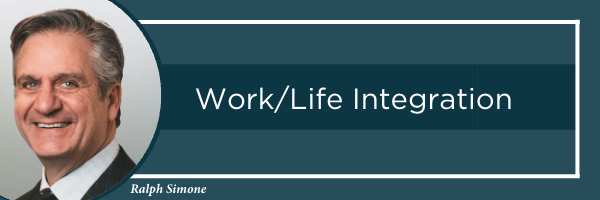I have been studying energy and time management for more years than I care to admit. For most of that period I was focused on finding work/life balance. It’s a logical goal to strive for: just enough work, and just enough life. If you get the proportions right, it’s smooth sailing.
But a few years ago, while teaching a leadership course at a healthcare facility, I had a revelation. I realized that I’d been misinterpreting the concept of balance. I was thinking in terms of segments and separation, and I was struggling. In life, it is difficult to balance all your important activities, even if, like me, you are committed to weekly planning. And it’s impossible to keep the various pieces of life separate, like two sides of a scale. But it is possible to view everything you do from a perspective of balance. Life is dynamic. Rather than trying to strike a balance, we should strive to approach all our tasks with an integrated consciousness, an awareness of the multidimensional nature of our lives. I call this work/life integration.
I define work/life integration as finding the rhythm to the work/life dance that enables us to bring our full energy and attention to the activities and relationships that matter most, when they matter most. This definition recognizes the dynamic nature of real life. And while planning is both important and helpful, most of our experiences are not plannable.
In retrospect, I have Ralph Bott to thank for this revelation. A good friend and professional colleague, Mr. Bott introduced me to a concept he was using as a leader at the Carrier Corporation: flextime. Ralph believed that giving his employees a measure of freedom in choosing their schedule and structure would have positive effects in all areas. He expected flexibility to be a win/win for both the company and employees, and he let the context of the activities drive the decision-making. Work/life integration and flextime are both/and concepts, interdependent values that are vital to long-term sustainability.
Successful work/life integration assumes that people are clear on their purpose and values, and that they build their weekly plan around what’s most important or essential. It also implies that they are constantly filtering or pruning activities and relationships that no longer serve them. They approach life as one whole interdependent reality, full of choices that ebb and flow at their own pace and speed. Work and life are not supposed to be separate; they are in fact intended to be integrated, moving from one to another in a seamless and focused way.
One of the planning hacks that I have developed over the years to help support work/life integration is 3,5,6,8. The basic aim of the practice is to create the space for integration by reminding us of the power we have to align our schedule with our purpose. It’s about emphasizing the essential through deliberate choice. For focus purposes, I set no more than 3 essential goals daily, and plan no more than 5 unique events (I define a unique event as an individual or group appointment made for a specified period during the day). I plan for 6 weeks per year “out of the business,” in order to restore, reflect, and rejuvenate, and I strive for 6 deep breaths per minute. Lastly, I plan for 8 hours of sleep each night.
These simple practices help maintain the focus and agility necessary to achieve work/life integration. They ensure we are acting from a space of centeredness, so that the choices we make every day reflect our purpose and values. When this is the case, work/life integration has been achieved, and it is, for the most part, smooth sailing.
Let’s stop looking at our work and our life as separate, and begin to treat them as interdependent and integrated. If you are interested in developing a lifestyle grounded in work/life integration, please contact me at [email protected].

Comments (1)
Ralph the concept as you have laid it out does integrate work activities into ones life in a planned way with flexibility a key element so that work tasks don’t overpower ones life. Individuals that come to the realization both work and life can exist together without one overpowering the other will be more satisfied employees, enjoy all that life offers and may have better health with less stress.
Thank you for the post!